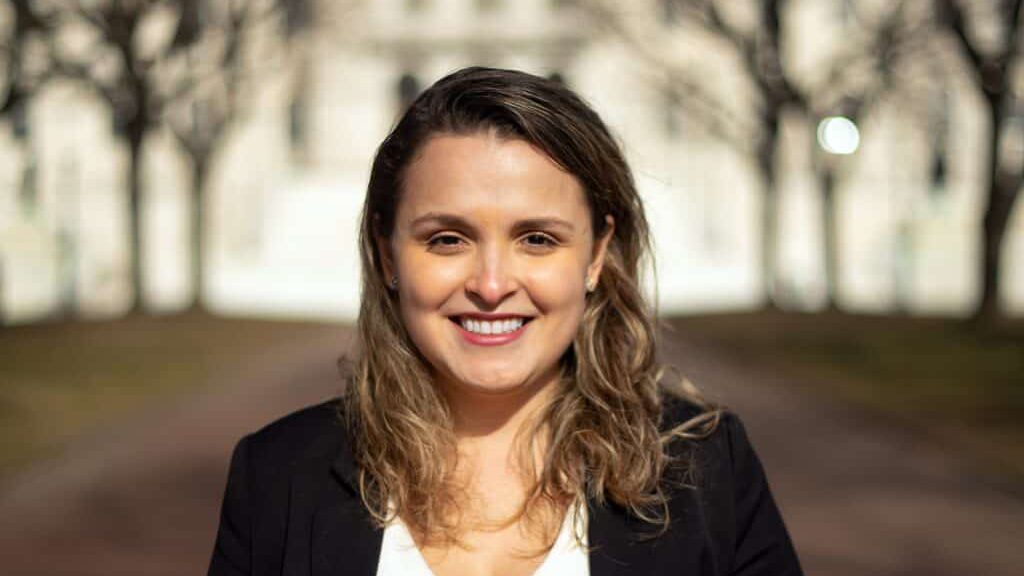The Latino Policy Institute (LPI) is celebrating 15-years of “educating, activating, and motivating community members and stakeholders to ignite positive change in the lives of all Latinos.”
LPI hosted an event on October 14 to commemorate its work, partnerships and successes.
celebrates with colleagues, 10/14/21
“It is an honor to celebrate the work, dreams, and dedication of those who have helped shape and grow LPI,” said Executive Director Marcela Betancur in an interview with GoLocalProv News. “While we have done so much, we still have so much more work to do. Let’s also recommit ourselves to the work we have ahead of us in achieving greater social, political, and economic equity for Latinos in Rhode Island.”
Betancur joined The Latino Policy Institute at Roger Williams University in 2019. “Marcela brings with her a plethora of experience, thoughtfulness and a lived commitment to the goals and values of LPI and RWU,” said Jamie E. Scurry, RWU’s Vice President of University College and a member of the LPI Board of Directors at the time of Bentancur’s announcement. “LPI serves a critical role in Rhode Island, and that role has never been more needed. Under Marcela’s direction, the organization will thrive, advancing the issues that matter most.”
Marcela’s early professional career began at the Providence Housing Authority where she helped lead and coordinate special programs and policies for its residents. Later, she went on to serve as the director of homeownership for NeighborWorks Blackstone River Valley, where she focused on serving first time homebuyers — specifically Latinos, immigrants, and millennials. Marcela worked as a policy associate for the American Civil Liberties Union of Rhode Island where she worked with local and statewide organizations to ensure that policies, laws, and regulations proposed or enacted protected civil and human rights for all Rhode Islanders.
Betancur grew up in Colombia and immigrated to the U.S. at age 12. That depth of experience was on display in an interview with WPRI when asked to provide insights on the Census 2020 data. “The Latino population nationwide and even in our state didn’t grow because of migration,” she said correcting a popular myth. “It’s actually through births.”
Hispanics-Latinos are more than 180,000 strong, making up nearly 17-percent of Rhode Island’s total population; twelfth highest percentage among the 50 states and Washington, D.C.
The number of residents is increasing in every city and town, with the highest concentration living in Providence County, where the group represents just over 24-percent.
SUGGESTION: Latinos: “We are here, we matter, and we make up a big part of Rhode Island”

“The performative nature of these heritage celebrations by certain companies and government officials is what really gets under my skin,” wrote Betancur in a column for The Valley Breeze. She was critical of how some people and organizations position themselves during Hispanic Heritage Month. “There is nothing cringier than seeing big-name companies using Hispanic or Latino “themes” in their advertisements during September and October. Trust me, having salsa music in your commercials won’t make us buy more of your product, as highlighted by the 2021 Edelman Trust Barometer. Having leadership positions filled by Latinos within your companies and honest social connections with our community will.”
When asked about how COVID-19 has disproportionately affected Hispanics-Latinos, Betancur was thoughtfully critical of the state’s response. “While our state has a great percentage of insured Rhode Islanders; 24-percent of Latinos are uninsured,” she said arguing that when the pandemic happened a lot of individuals were uninsured or underinsured. “I don’t think that as a state or as a society we have focused enough in the Latino community in the important issues that affect our life – our education, our health, our economic wealth.”
LPI was founded in 2005, and has since continued to inform and shape public policy discourse by objectively examining the evolving Latino experience in Rhode Island.




